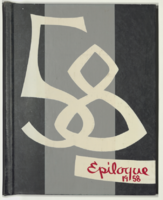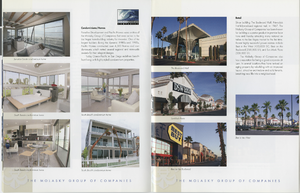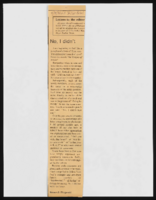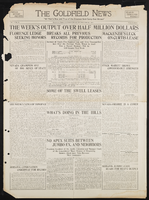Search the Special Collections and Archives Portal
Search Results

Epilogue: Nevada Southern University Yearbook, 1958
Date
Description
Yearbook main highlights: schools and departments; detailed lists with names and headshots of faculty, administration and students; variety of photos from activities, festivals, campus life, and buildings; campus organizations such as sororities, fraternities and councils; beauty contest winners; college sports and featured athletes; and printed advertisements of local businesses; Institution name: Nevada Southern University, Las Vegas, NV
Mixed Content

Corey Nyman oral history interview: transcript
Date
Archival Collection
Description
Oral history interview with Corey Nyman conducted by Claytee D. White on May 04, 2018 for the Remembering 1 October Oral History Project. In this interview, Nyman recalls his high school and college experiences, and working in Las Vegas, Nevada as a young adult. On October 1, 2017, Nyman attended the Route 91 Country Music Festival with his brother and a group of friends. They enjoyed the concert from the Red Bull VIP suite, which Nyman felt helped them escape bullets as he and his friends helped others escape. About three hours after escaping the venue, they arrived at Tropicana Avenue and Koval Lane where their ride picked them up. The driver was one of the last allowed into the area under the airport underpass. Nyman discusses his feelings since the shooting, and states that he loves the city and has made it his home despite the traumatic events of the night.
Text

Amber Diskin oral history interview: transcript
Date
Archival Collection
Description
Oral history interview with Amber Diskin conducted by Barbara Tabach on January 5, 2018 for the Remembering 1 October Oral History Project. In this interview, Amber Diskin discusses her experience at the Route 91 Harvest music festival during the October 1, 2017 mass shooting in Las Vegas, Nevada. Diskin talks about finding her way home after escaping the crowds and letting her family and friends know she was not hurt. She speaks of the aftermath of the shooting, including how her children were affected, the post-traumatic stress disorder she developed, and how the shooting has affected her love of concerts. As a native Nevadan, she shares her views of Las Vegas and how her sense of community deepened after this event. Diskin ends the interview by discussing her appreciation for the first responders and the gift baskets she helped distribute to hospitals, police stations, and the fire department.
Text

Brochure from the Molasky Group of Companies, approximately 2010
Date
Archival Collection
Description
This brochure includes highlights of the Molasky Group of Companies, specializing in real estate development.
Text

"The Reintegration of Las Vegas": paper by Roosevelt Fitzgerald
Date
Archival Collection
Description
From the Roosevelt Fitzgerald Professional Papers (MS-01082) -- Unpublished manuscripts file. Presented at the Western Social Science Association, 31st Annual Conference, Albuquerque, New Mexico.
Text

Carmon Meswarb interview, April 15, 1976: transcript
Date
Archival Collection
Description
On April 15, 1976, Judy Hammer interviewed Carmon Meswarb (b. February 9, 1932 in Cedar Falls, Iowa) about his life as a musician in Las Vegas, Nevada. Meswarb discusses how he ended up in Las Vegas, the musicians union and his time playing in a relief band. Meswarb also delves into the different entertainment acts of the 1950s and 1960s, the big-name performers, the city’s showgirls and racial segregation in entertainment. Moreover, Matson talks about the changing landscape of the city, residential areas and the changed attitude of the Strip. The interview ends with Meswarb discussing the short stint of Broadway shows on the Las Vegas Strip.
Text

Transcript of interview with Ann K. Johnson by Wanda Cortés, March 3, 1980
Date
Archival Collection
Description
On March 3, 1980, Wanda Cortés interviewed University of Nevada, Las Vegas counselor, Ann K. Johnson (born August 28th, 1954 in Garland, Arkansas) about her life in Southern Nevada. The two discuss Johnson’s educational and occupational history. The interview concludes with a discussion on the population’s rapid growth during the seventies.
Text

Transcript of interview of Thalia Dondero by Mary Germain, March 13, 1976
Date
Archival Collection
Description
On March 13, 1976, Mary Germain interviewed Thalia Dondero (born 1921 in Greeley, Colorado) about her life in Nevada and her experiences as the first female commissioner for the Clark County Commission. Dondero first talks about her upbringing and her eventual move to Southern Nevada. She also discusses her involvement in extracurricular activities, such as being a leader for the Girl Scouts, and how some of those experiences led her to get involved in politics. Dondero also mentions her work with National Geographic and her passion for working with oil paintings and watercolors. The final part of the interview involves some of Dondero’s accounts as a commissioner for Clark County and some of the challenges she has faced in that position.
Text

Transcript of interview with William E. "Bilbo" Helms by Denise Wolff, March 4, 1980
Date
Archival Collection
Description
On March 4, 1980, collector Denise Wolff interviewed truck driver and teacher, William E. “Bilbo” Helms (born on December 7th, 1932 in Memphis, Tennessee) in an office room at Bonanza High School in Las Vegas, Nevada. This interview covers the transformation, growth, and development of the public education system in Las Vegas, Nevada.
Text

